Laurel Tree Meaning in Bible: Victory and Divine Favor
In biblical texts, the laurel tree symbolizes victory, divine favor, and eternal life. Psalm 37:35 refers to it as a ‘green bay tree,’ signifying prosperity and flourishing.
Its evergreen nature represents God’s eternal blessings and the ultimate triumph of righteousness. Passages like 1 Corinthians 9:24-25 highlight the imagery of believers working for an imperishable crown, denoting spiritual perseverance and reward.
Similarly, Isaiah 55:13 and Psalm 1:3 use the laurel to indicate the divine transformation and steadfast faith of the righteous. For those interested, further exploration reveals more profound theological implications and biblical insights.
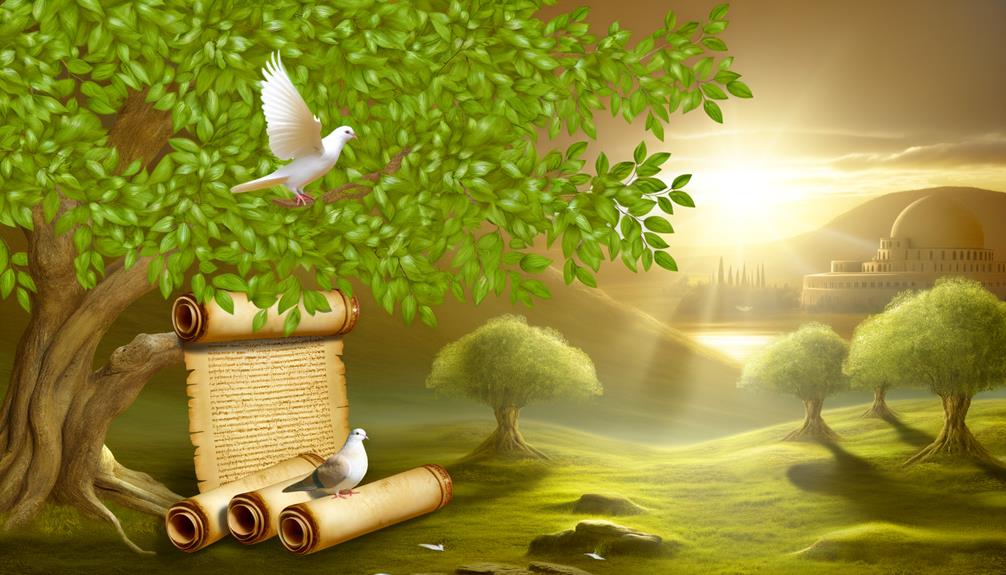
Laurel Tree Meaning in the Bible: Symbolism, Spiritual Insights, and Biblical References
| Aspect | Symbolic Meaning | Biblical Reference |
|---|---|---|
| Victory and Triumph | The laurel tree represents victory in life’s spiritual battles, often associated with crowns of laurels as a reward for perseverance. | 1 Corinthians 9:25 |
| Eternal Life | Symbolizes immortality and the eternal reward awaiting the faithful in heaven, reflecting God’s promise of everlasting life. | 2 Timothy 4:8 |
| Righteousness | The evergreen nature of the laurel reflects an enduring and steadfast faith, symbolizing moral integrity and righteousness. | Psalm 1:3 |
| Divine Blessing | Associated with prosperity, fruitful living, and God’s favor upon the faithful. | Proverbs 11:30 |
| Peace and Protection | Laurel branches were also used in ancient times for peace and protection, symbolizing divine security and harmony. | Zechariah 3:10 |
Biblical Mentions of Laurel
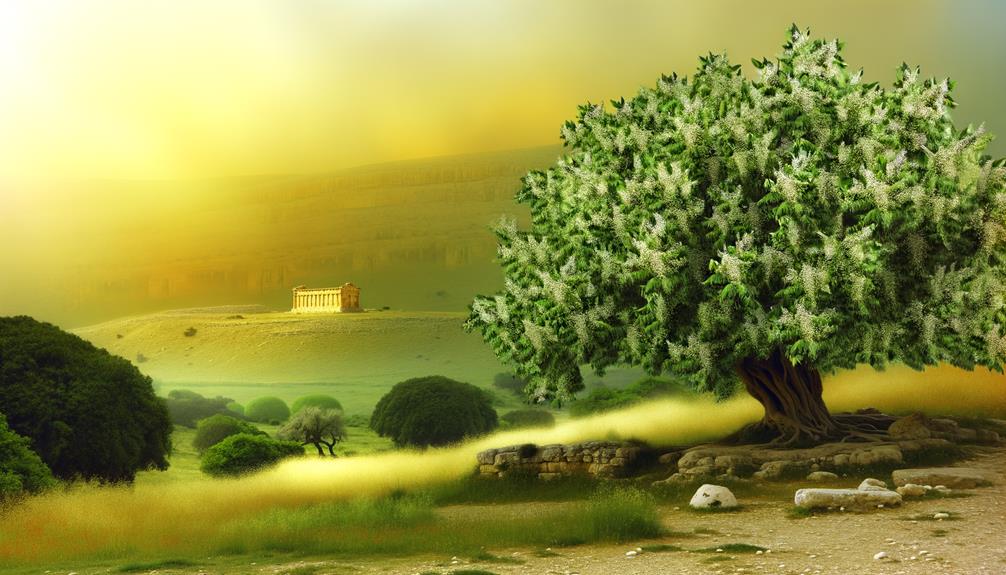
In the Bible, the laurel tree is mentioned primarily in the context of victory and triumph, symbolizing honor and accomplishment. The laurel, or bay tree, appears in passages such as Psalm 37:35, where it is likened to a ‘green bay tree,’ signifying prosperity and flourishing life.
Historically, the laurel wreath was awarded to victors in ancient Greek and Roman cultures, a tradition that influenced biblical symbolism. Theologically, the laurel can be seen as representing God’s favor and the ultimate triumph of righteousness.
Scripturally, the laurel’s enduring green leaves are evocative of eternal life and divine blessing, connecting natural imagery with spiritual truths. Consequently, the laurel in biblical texts transcends mere flora, embodying deeper theological themes.
Symbolism of Victory
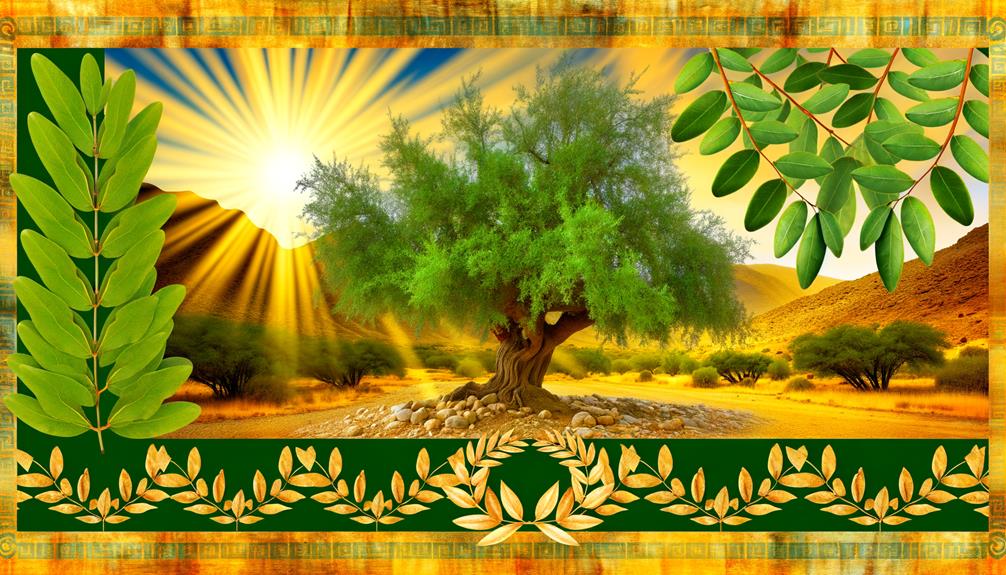
In ancient biblical references, the laurel tree is often associated with victory and triumph, symbolizing both physical and spiritual conquest.
This symbolism is evident in 1 Corinthians 9:24-25, where Paul likens the Christian life to a race in which believers endeavor for an imperishable crown. Just as athletes train rigorously to achieve a tangible reward, Christians are called to persevere in their faith, knowing that their ultimate prize lies beyond this life. Moreover, the symbolism of the serpent in scripture serves as a reminder of both temptation and healing, illustrating the dual nature of struggle within the believer’s journey. Ultimately, these symbols guide Christians in their pursuit of spiritual growth and resilience.
The theological significance extends to spiritual triumph, portraying the laurel as a representation of enduring faith and ultimate victory in Christ.
Ancient Biblical References
Frequently mentioned in ancient biblical texts, the laurel tree is imbued with profound symbolism of victory and triumph. This sacred tree, often associated with divine favor, appears in various scriptural references that highlight its significance. In Isaiah 55:13, the laurel is depicted as a symbol of everlasting joy and triumph over adversity. The Apostle Paul, in 1 Corinthians 9:24-25, draws a parallel between the laurel wreath awarded to victors in athletic games and the imperishable crown promised to believers.
| Scripture Reference | Symbolism | Context |
|---|---|---|
| Isaiah 55:13 | Everlasting joy | Triumph over adversity |
| 1 Corinthians 9:24-25 | Imperishable crown | Reward for faithfulness |
| Psalm 37:35 | Righteous prosperity | Contrast to wickedness |
| Zechariah 1:8-10 | Divine favor | Vision of God’s presence |
| Proverbs 11:28 | Flourishing life | Contrast to material wealth |
Spiritual Triumph Significance
The laurel tree, deeply rooted in biblical tradition, symbolizes spiritual triumph and divine victory, serving as a profound emblem of the faithful’s ultimate reward.
Historically, the laurel’s association with victory is evident in ancient Greco-Roman culture, which influenced early Christian symbolism. The Apostle Paul, drawing from this imagery, exhorts believers to ‘run in such a way as to get the prize’ (1 Corinthians 9:24), alluding to the laurel wreath awarded to victors.
This theological insight underscores the laurel’s representation of eternal life and God’s approval. Revelation 2:10 further reinforces this symbolism, promising the ‘crown of life‘ to those who remain steadfast in faith, echoing the laurel’s enduring significance as a metaphor for spiritual conquest and divine reward.
Evergreen Significance

In biblical literature, the evergreen nature of the laurel tree holds profound theological significance, symbolizing eternal life and unfading spiritual strength, as reflected in Psalm 1:3, which speaks of the righteous as trees that remain green and fruitful.
Additionally, its association with victory and triumph, as seen in 1 Corinthians 9:24-25, underscores the perpetual reward awaiting the faithful.
The enduring greenery of the laurel consequently becomes a powerful metaphor for the believer’s everlasting communion with God.
Symbol of Eternal Life
Laurel trees, often celebrated for their evergreen nature, symbolize the concept of eternal life within biblical texts, reflecting the enduring and unchanging nature of divine promises.
Historically, the evergreen quality of the laurel signifies immortality, a theme echoed in the Scriptures.
For instance, Psalm 1:3 describes a righteous person as a tree planted by streams of water, yielding fruit in season and whose leaf does not wither. This imagery underscores the perpetual significance and spiritual continuity granted by a life rooted in divine wisdom.
The unwithering foliage of the laurel consequently becomes a powerful metaphor for the everlasting covenant between God and His people, representing unwavering faith and the promise of life beyond temporal existence.
Victory and Triumph
Throughout biblical literature, the evergreen nature of the laurel tree is frequently associated with victory and triumph, symbolizing divine favor and the ultimate success of righteousness.
Historically, the laurel wreath was awarded to victors in ancient Greek and Roman contexts, a practice echoed in the Bible. In 1 Corinthians 9:24-25, Paul alludes to this tradition, urging believers to endeavor for an imperishable crown. Theologically, this signifies that true victory is not temporal but eternal, granted by God to the faithful.
Additionally, Psalms 37:35-36 contrasts the fleeting success of the wicked with the enduring prosperity of the righteous, metaphorically linking the laurel’s permanence to divine triumph.
Consequently, the laurel tree embodies enduring victory and divine approval in biblical symbolism.
Unfading Spiritual Strength
Embodying the concept of unfading spiritual strength, the evergreen nature of the laurel tree in biblical symbolism underscores the perpetual significance and resilience granted to the faithful by God.
Historically, evergreen trees represented eternal life in various cultures, and the laurel’s unchanging greenery aligns with biblical themes of enduring faith.
Psalm 1:3 describes the righteous as ‘a tree planted by streams of water, which yields its fruit in season and whose leaf does not wither.’
Theologically, the laurel’s evergreen quality signifies the unwavering spiritual energy bestowed upon believers, sustaining them through trials.
This symbolism reinforces the message that true faith, like the laurel, remains steadfast and vibrant, reflecting God’s unending support and strength.
Perseverance in Scripture

In the Bible, the concept of perseverance is deeply intertwined with the imagery of the laurel tree, symbolizing victory and steadfast faithfulness.
Historically, the laurel wreath was awarded to victors in ancient athletic competitions, a practice mirrored in 1 Corinthians 9:24-25, where Paul exhorts believers to run their spiritual race with perseverance to receive an imperishable crown.
Theologically, the laurel signifies enduring faith, as seen in James 1:12, which promises the crown of life to those who persevere under trials.
Revelation 2:10 further emphasizes this, encouraging believers to remain faithful even unto death for the ultimate reward.
Consequently, the laurel tree encapsulates the biblical mandate for persistence in faith and the assurance of divine reward.
Righteousness Representation
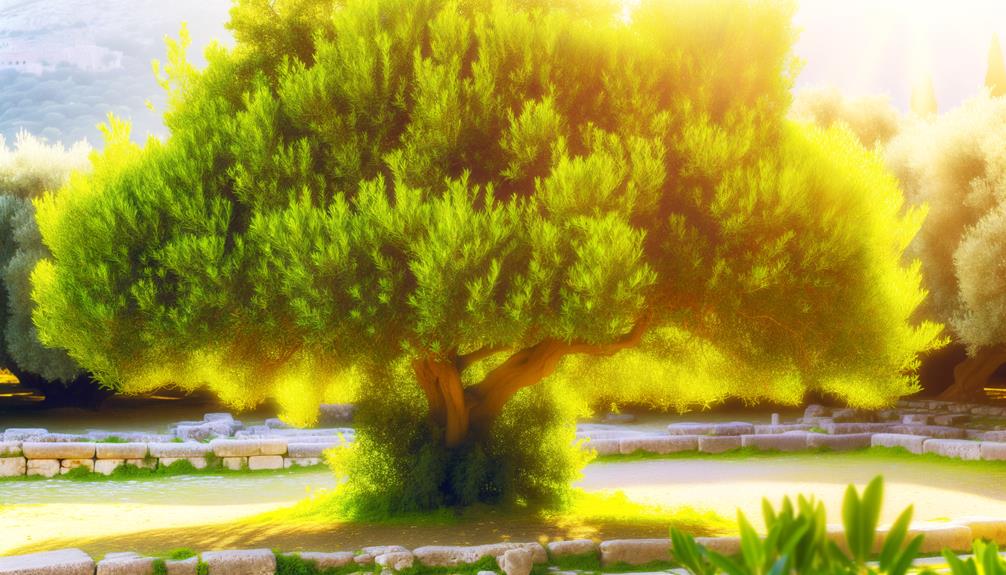
In biblical texts, the laurel tree often symbolizes righteousness, manifesting itself as a symbol of victory, eternal life, and divine favor.
Historically, laurel wreaths were awarded to victors in athletic competitions, paralleling spiritual triumphs as expressed in 2 Timothy 4:7-8, where the ‘crown of righteousness‘ is promised to those who have persevered in faith.
Additionally, the evergreen nature of the laurel signifies eternal life and unending favor, reinforcing its theological significance as an emblem of God’s enduring grace and approval.
Symbol of Victory
Throughout biblical history, the laurel tree has been revered as a potent symbol of victory and righteousness. Rooted in ancient traditions, the laurel’s significance is evident in scriptural texts where it represents triumph over adversity.
In 2 Timothy 2:5, the Apostle Paul writes, ‘if anyone competes as an athlete, he does not receive the victor’s crown unless he competes according to the rules,’ drawing a parallel to the laurel wreaths awarded in ancient games.
Theologically, the laurel embodies divine favor and moral integrity, indicating a life led according to God’s statutes. Its evergreen nature further underscores enduring righteousness, signifying the perpetual reward for those who uphold God’s commandments.
Consequently, the laurel tree encapsulates the biblical essence of victorious perseverance.
Eternal Life Significance
Rooted in its evergreen nature, the laurel tree emerges as a profound symbol of eternal life and righteousness within biblical theology. The tree’s perpetual verdancy is often associated with the eternal nature of God’s covenant and the righteousness that believers are called to embody.
Psalm 1:3 likens the righteous to a tree planted by streams of water, yielding fruit in its season, with leaves that do not wither. This imagery underscores the laurel’s representation of spiritual significance and perpetual life in God’s presence.
Additionally, the evergreen quality of the laurel resonates with the promise of eternal life found in John 3:16, where belief in Christ offers everlasting life.
Consequently, the laurel signifies both the eternal and unchanging righteousness bestowed upon the faithful.
Divine Favor Indicator
The laurel tree, revered for its enduring foliage, serves as a potent biblical symbol of divine favor and the righteousness that God imparts to His faithful followers.
Historically, the laurel wreath was used to crown victors in ancient Greece, signifying honor and glory, which parallels its scriptural representation.
- Psalm 37:35-36: The righteous flourish like a green laurel tree.
- 1 Corinthians 9:25: The laurel wreath represents the imperishable crown.
- Proverbs 11:30: The fruit of the righteous is a tree of life.
- Revelation 2:10: The faithful are promised the crown of life.
These references highlight the laurel as a divine acknowledgment of spiritual integrity and steadfastness.
Eternal Life Imagery

Biblical references to the laurel tree often evoke imagery of eternal life, symbolizing victory and everlasting peace through its evergreen nature and enduring presence in scriptural texts.
Historically, the laurel tree’s unchanging foliage served as a metaphor for immortality and eternal rewards, aligning with theological concepts of life after death.
For instance, in 1 Corinthians 9:25, believers are encouraged to endeavor for an ‘imperishable crown,’ akin to the laurel wreaths awarded to victors in ancient competitions.
The laurel’s resilience and perpetual greenery underscore divine promises of eternal life and unending fellowship with God.
Consequently, the laurel tree becomes an emblem of the eternal life promised in Christian eschatology, reflecting God’s unwavering presence and the believer’s ultimate triumph over death.
Prophetic References
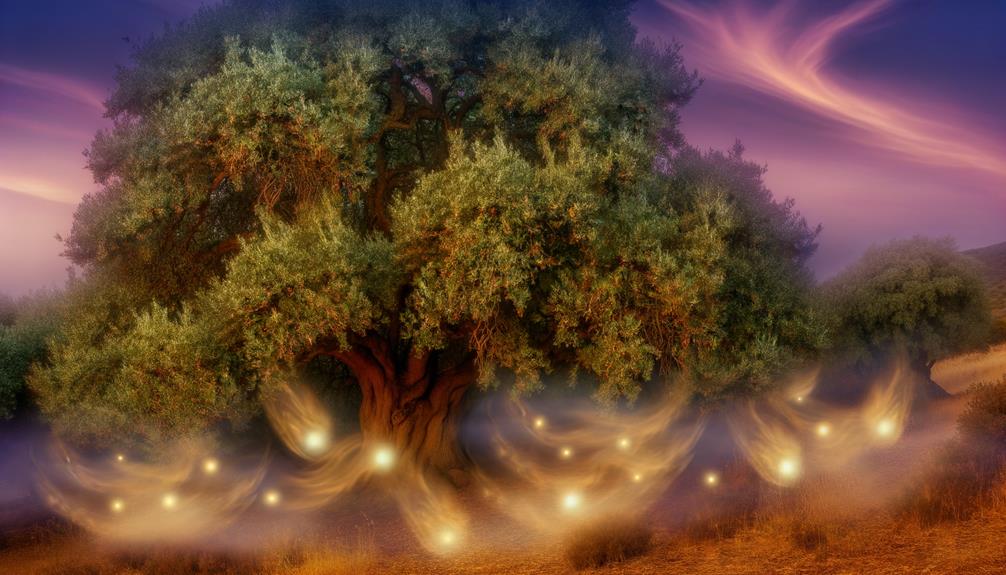
Several prophetic texts in the Bible incorporate the laurel tree to symbolize divine favor, triumph, and the fulfillment of God’s promises. This symbolism is rooted in the historical context where laurel wreaths were awarded to victors, signifying achievement and honor. Theologically, the laurel’s enduring green leaves represent eternal blessings and God’s unwavering faithfulness.
Key prophetic references include:
- Isaiah 55:13: Transformation of thorns into laurel trees, symbolizing renewal.
- Zechariah 3:8-10: The Branch, a messianic title, bringing peace.
- Jeremiah 17:7-8: The righteous compared to trees planted by water.
- Revelation 2:7: The tree of life promise to the faithful.
These references collectively underscore the laurel’s profound spiritual significance.
Laurel in Psalms

Psalms often utilize the imagery of the laurel tree to convey themes of divine protection, righteous flourishing, and enduring faithfulness.
Throughout the Psalms, the laurel symbolizes the steadfastness of the faithful under God’s care. For instance, Psalm 1:3 likens a righteous individual to a tree planted by streams of water, yielding fruit in season, whose leaf does not wither. This imagery evokes the evergreen nature of the laurel, underscoring the idea of spiritual resilience and continual divine favor.
In addition, Psalm 92:12-14 emphasizes the flourishing of the righteous like a palm tree and cedar, implicitly aligning with the laurel’s symbolism of victory and longevity. These references highlight the enduring strength and liveliness bestowed by a life rooted in faith.
New Testament Context
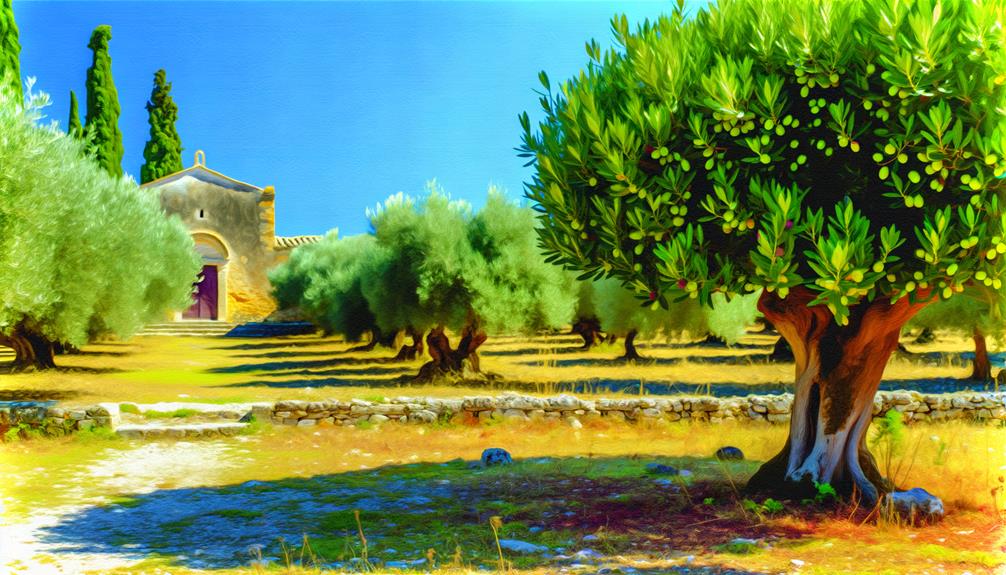
In the New Covenant, the laurel tree emerges as a potent symbol of triumph and eternal life, deeply embedded within the theological framework of early Christian thought.
The Apostle Paul, in 1 Corinthians 9:24-25, likens the Christian journey to a race, where the victor receives an imperishable crown, metaphorically represented by the laurel wreath. This imagery resonates profoundly with early Christians, drawing from Greco-Roman traditions of awarding laurel crowns to victors.
1 Corinthians 9:24-25: Apostolic metaphor of the imperishable crown.
2 Timothy 4:7-8: Paul anticipates his crown of righteousness.
Revelation 2:10: Promise of the crown of life to the faithful.
Cultural Context: Greco-Roman victory traditions.
Eternal Life: Laurel as a symbol of eternal reward.
Old Testament Insights

Frequently, the Old Covenant references various trees and plants, yet the laurel tree, in particular, emerges as a symbol of victory and divine favor, resonating through prophetic literature and historical narratives.
In Isaiah 55:13, the substitution of the thornbush with the laurel signifies the transformation and renewal brought by God’s blessings. The laurel’s enduring green leaves epitomize eternal life and unwavering faithfulness, which mirrors God’s perpetual covenant with Israel.
Additionally, in Zechariah 1:8-11, the presence of laurel trees in the vision underscores peace and divine protection.
These scriptural references encapsulate the laurel’s profound significance in the Old Scripture, melding historical context with theological insight, reflecting God’s providence and the hope of restoration for His people.
Spiritual Lessons

The laurel tree’s prominence in biblical text offers profound spiritual lessons, symbolizing victory, divine favor, and the enduring nature of God’s covenant with His people.
Historically, the laurel was used to crown victors, reflecting the ultimate triumph of righteousness in Scripture. Theologically, the laurel embodies divine approval and blessing, as seen in Psalms where the righteous flourish like a tree (Psalm 1:3).
In addition, it signifies the eternal covenant between God and His believers, akin to the evergreen nature of the laurel that remains vibrant through all seasons.
- Victory: Crowns of laurel symbolize triumph and success.
- Divine Favor: Represents God’s blessing and approval.
- Eternal Covenant: Reflects the unending promise of God.
- Righteous Flourishing: Echoes Psalm 1:3’s imagery.
Conclusion
Ironically, the laurel tree, scarcely mentioned in biblical writings, emerges as a profound symbol of victory, perseverance, and righteousness.
Its evergreen nature subtly underscores the eternal triumph of the faithful, while its rare appearances in Psalms and other scriptures highlight its significance.
Both Old and New scriptures contexts enrich the understanding of this resilient plant, offering spiritual lessons that, though seemingly obscured, remain deeply entrenched in theological discourse.






